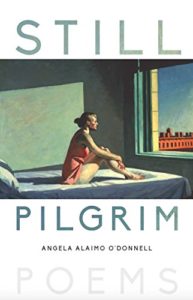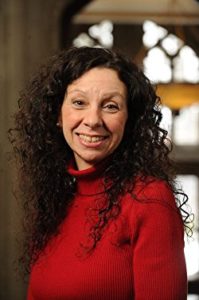
Still Pilgrim by poet Angela Alaimo O’Donnell unintentionally poses a question from the outset, and that question is the title, specifically the word “still.” Does it mean “continuing to be” a pilgrim, or does it mean still in the sense of quiet or motionless? Or perhaps both? Or can one imagine a comma and read it as a command, as in “Be still, pilgrim”?
The word “pilgrim” doesn’t help answer the question. Americans still associate the word with settlers from England who settled in Massachusetts (and not the same as the Puritans). But a pilgrim can be anyone who takes a journey for reasons of reflection, escape from an unpleasant or dangerous environment, and spiritual experience and renewal like the Way of St. James de Compostela.
But once you begin reading the 58 poems of Still Pilgrim, the answer becomes clearer. This is the story of a life, a life understood as a pilgrimage, and a life in which even the smallest of events and experiences are grasped as part of the journey.
Sometimes, the steps of the journey and discovery are planned and deliberate. And so the pilgrim (and every poem title in the collection includes the words “still pilgrim”) visits Ellis Island, recollects her childhood, visits the catacombs and the British Museum, and considers Sicily, the home of her ancestors.
The pilgrim also almost accidentally discovers her pilgrimage in the reality of the everyday. She becomes a mother and sings to her child; she hears a story; she celebrates spring; she giveds herself driving lessons; and she falls in love. And she evens runs.
The Still Pilgrim Runs

as if her patella would never slip,
her ankle never turn or break,
her size nine feet never lose their grip-
and-give as they kissed and fled the earth.
She ran like one pursued by fear,
Bears in her childhood, disease and dearth,
the knowledge that all would disappear.
She ran, a hart pursued by hounds,
their barking slowly sounding nearer.
Her thighs never tired, her knees knew no bounds,
They could not leap gracefully over.
She ran like rage. She ran like desire.
She ran like a woman catching fire.
The still pilgrim also understands her vocation to be part of the pilgrimage. She considers her options; she stalks Wordsworth; she studies metaphor; and she reinvents Shakespeare.

Angela Alaimo O’Donnell
O’Donnell emphasizes these poems as pilgrimage but using the sonnet form with every one of them. The formality of the poems highlights each as a recognition of how a life is created and developed, what influences that life and shapes it. Still Pilgrim is not a chronological biography for the simple reason that our understanding of our lives never happens in the order that things happen.
O’Donnell has published several collections of poetry, including Mine: Poems (2007); Moving House: Poems (2009); Saint Sinatra (2011); and Lover’s Almanac (2015). She’s also the author of a moving memoir, Waking My Mother (2013); The Province of Joy: Praying with Flannery O’Connor (2012); and an analysis the fiction of Flannery O’Connor, Fiction Fired by Faith (2015).
It would be easy to answer my question about the title of Still Pilgrim with a simple “It’s both continuing to be and the sense of motionlessness and quiet.” But my own sense is that it’s the former more than the latter. Our lives are indeed pilgrimages, sometimes shared with others and sometimes experienced alone, pilgrimages understood in the now and sometimes understood only much later.
But still pilgrimages.
Related:
My review of Mortal Blessings.
My review of The Province of Joy.
Angela Alaimo O’Donnell’s Saint Sinatra.
Browse more poets and poems
Photo by Martinak15, Creative Commons, via Flickr. Post by Glynn Young, author of the novels Dancing Priest and A Light Shining, and Poetry at Work.
__________________________

“I require all our incoming poetry students—in the MFA I direct—to buy and read this book.”
—Jeanetta Calhoun Mish
- Longfellow’s “Paul Revere’s Ride”: Creating a National Legend - April 17, 2025
- Poets and Poems: Katie Kalisz and “Flu Season” - April 15, 2025
- Poets and Poems: Michelle Ortega and “When You Ask Me, Why Paris?” - April 10, 2025
Maureen says
I love Angela’s work. The sample poem from the collection is redolent with her lyricism and fluidity. Her poems (also true of ‘The Still Pilgrim Runs’) betrays the ease with which she uses traditional forms. That she uses the sonnet form and that the collection appears now, during Lent, are wonderfully apt.
Sandra Heska King says
I think there’s a lot wrapped up in the little word, “still.” Running like a race horse or a hart pursued by hounds, like rage or desire or woman catching fire is anything but still. Maybe there’s a bit of inner stillness, a firm resolve to experience all of life. I’ve already ordered this.
Megan Willome says
All sonnets? I’m impressed.